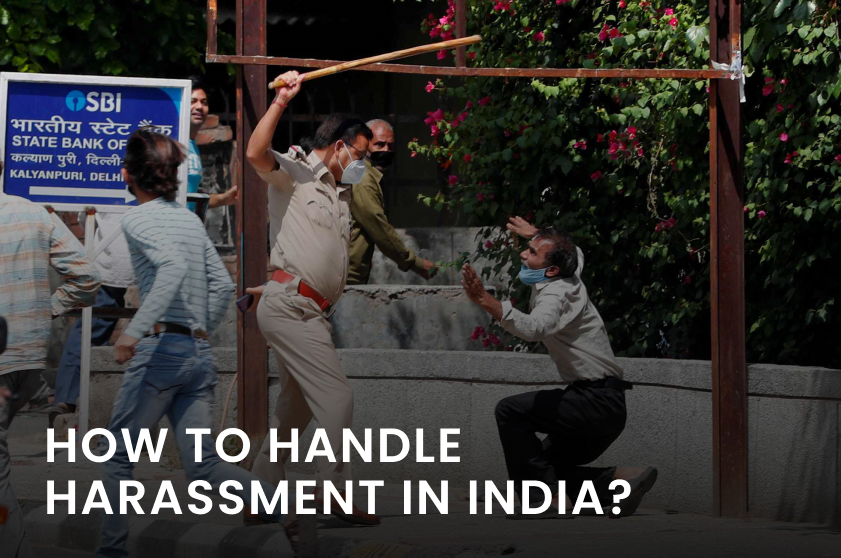Blogs
How to Handle Harassment by Police in India
Police officers are entrusted with upholding law and order, but instances of police harassment can erode public trust. Here’s how you can handle such situations legally and calmly.
Know Your Rights
- Right to Silence: You cannot be forced to self-incriminate.
- Right to Legal Counsel: Seek a lawyer before making statements.
- Right Against Arbitrary Arrest: Arrests require valid reasons and documentation under Section 41 of the CrPC.
Steps to Handle Harassment
- Stay Calm: Avoid escalating the situation.
- Document the Incident: Note down names, badge numbers, and details.
- Contact Higher Authorities: File a complaint with senior officers, such as the Superintendent of Police.
- File an FIR: Report police misconduct at your local police station or online.
- Seek Legal Help: Approach the Human Rights Commission or a legal NGO.
Legal Provisions
- Police Complaints Authority: File grievances for abuse of power.
- Article 22 of the Constitution: Ensures protection against arbitrary detention.
Conclusion
Empowering yourself with knowledge of your rights can help you navigate instances of police harassment with confidence. The legal system is designed to protect citizens, so use it to seek justice.
Right to Privacy in India
The Right to Privacy in India has evolved as a cornerstone of individual freedom and dignity. Recognized as a fundamental right under the Indian Constitution, it ensures that citizens can safeguard their personal lives from unwarranted interference.
What is the Right to Privacy?
The Right to Privacy means individuals have control over their personal information, protecting them from government and private intrusion.
Landmark Judgments
The Supreme Court of India cemented privacy as a fundamental right in the Puttaswamy v. Union of India (2017) judgment.
- It falls under Article 21, which guarantees the right to life and personal liberty.
- Privacy is integral to freedom of speech, dignity, and autonomy.
Scope of Privacy
- Personal Information Protection: Safeguarding data from misuse.
- Surveillance and Security: Ensuring government surveillance respects privacy.
- Digital Privacy: In the age of Aadhaar and social media, privacy in cyberspace is critical.
Challenges in India
- Weak data protection laws.
- Rising cyber threats and surveillance concerns.
- Balancing privacy with national security.
Conclusion
The Right to Privacy empowers citizens to maintain their autonomy in a rapidly digitizing world. Strengthening its implementation remains crucial for ensuring trust and freedom in society.
patent vs trademark explained
Patent vs. Trademark: What’s the Difference?
In today’s competitive world, safeguarding intellectual property is crucial for innovators and businesses. Two common tools for this protection are patents and trademarks. While often confused, these terms serve distinct purposes. Let’s break it down.
What is a Patent?
A patent provides exclusive rights to an inventor for a novel invention, process, or design.
- Purpose: To protect technological innovations.
- Duration: Typically 20 years in India.
- Example: A new pharmaceutical drug or a unique machine design.
What is a Trademark?
A trademark safeguards brand identity, such as a name, logo, or slogan.
- Purpose: To protect brand recognition and goodwill.
- Duration: Renewable every 10 years.
- Example: The Nike swoosh logo or the tagline "Just Do It."
Key Differences
| Aspect | Patent | Trademark |
|---|---|---|
| Protects | Inventions and designs | Brand elements |
| Duration | Limited to 20 years | Renewable indefinitely |
| Registration Process | Involves technical scrutiny | Relatively simpler |
Conclusion
Understanding the distinction between patents and trademarks helps businesses protect their ideas and brand identities effectively. Whether you’re launching an innovative product or building a recognizable brand, choosing the right protection strategy is key to long-term success.
Consult us

We'd love to hear from you! Whether you have a question about our courses, need assistance, or just want to say hello, we're here for you. Feel free to reach out by clicking the button below.



.png)
.png)
.png)